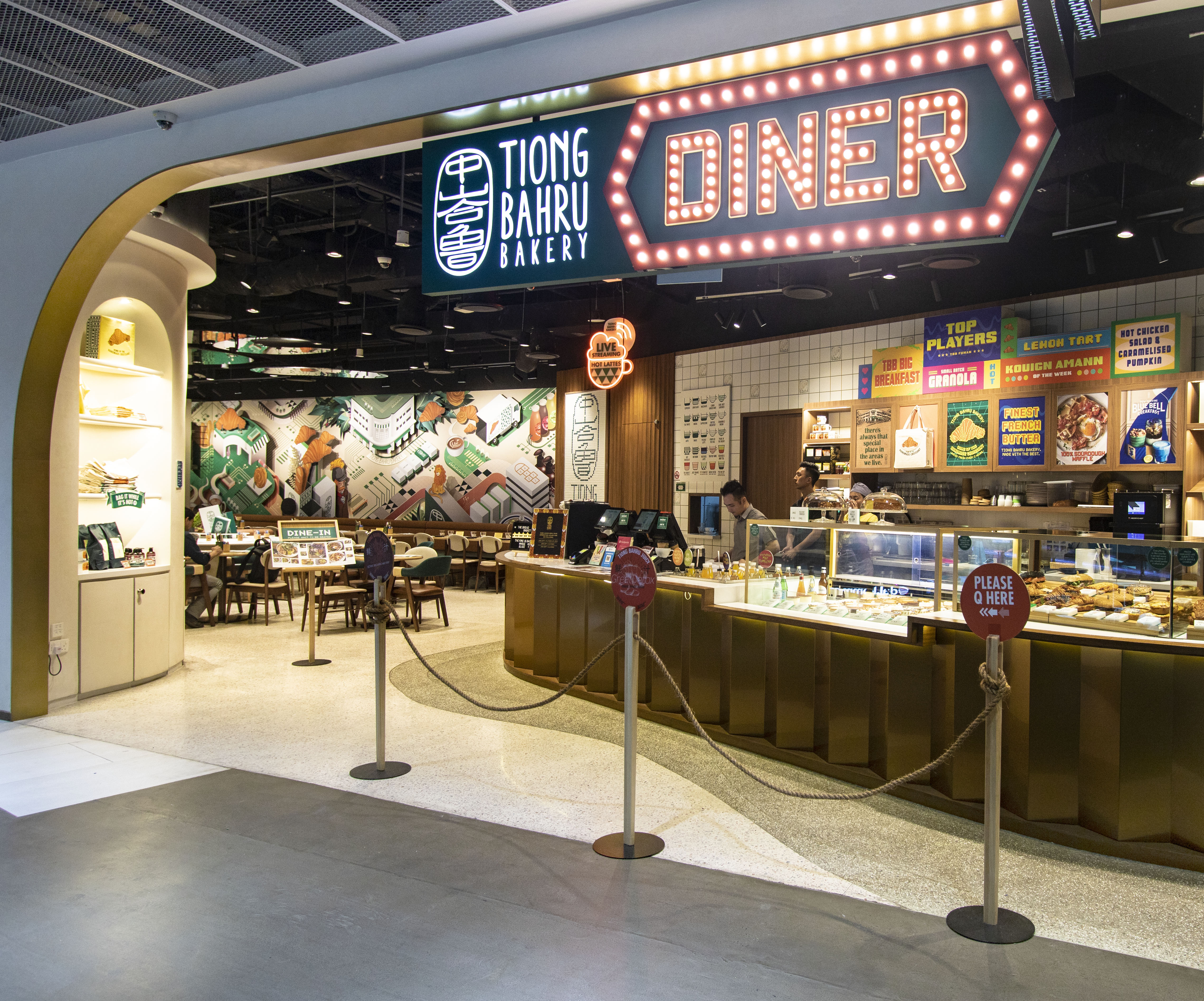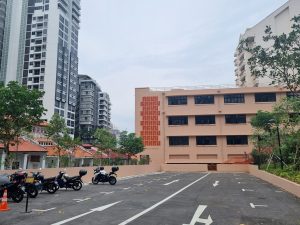“In my 24 years of operation, even during the Sars 2003 period and 2009 Global Financial Crisis, I’ve never had a landlord come and reduce my rent,” says Cynthia Chua, founder and director of Spa Esprit Group and chairwoman of WonderScape Holdings.
“It’s disheartening. While some landlords are proactive, many are detached from reality. We don’t feel the togetherness of working together.”
The landlords F&B operators deal with are familiar names: Capitaland, Far East Organization, Mapletree, Fraser, LendLease, NTUC, SPH REIT, Mercatus, Starhill, JTC, amongst others. They run a gamut of real estate from malls and commercial properties to residences and neighbourhood shops.
Historically, the landlord-tenant relationship has always been a tenuous, one-sided affair. Rentals and other costs are usually paid monthly via GIRO, and if a tenant fails to make payment, landlords charge interest and penalty fees, up to the rental deposit(s), minus reinstatement, before eviction. It’s arm’s length with legal eagles.
Now that Covid-19 has hit hard, F&B operators are feeling the heat. If landlords do not help, many operators will be left to fend for themselves, if they’re able to at all.
“(Covid-19) is absolutely the worst thing that has happened,” exclaims former-radio-DJ-turned-entrepreneur Daniel Ong, who runs the three Rookery restaurants at Capital Tower, China Square, and Hong Leong Building. Since going into F&B in 2011, he doesn’t remember anything that has impacted the business in such a way. Not even SARS, not even MERS.
In his words, “This Covid-19 situation has really been a triple whammy.”

Ong’s restaurants’ revenue has fallen 70 to 80% even before the no-dine-in rule on 7 April. He plans to liquidate some assets and put in more money to remain afloat. He recently took out a S$200k loan, but it’s not enough. He estimates he needs at least a S$1m loan for the next 6 months. After which repayment will be another headache.
“It is looking dire and I speak on behalf of hundreds of F&B operators who have talked to me.”
(Because of Covid-19), the F&B industry has been suffering since February. It’s been a slow death. If you want to resuscitate the patient, hopefully the patient is still alive. There will be many who will not survive till then. It may not be enough.
– SM Pang, COO of New Ubin Group
“In happy times, our rental was 9% of our sales. Now, those same rentals are 30-40% of our sales. It becomes difficult for us to live on that level,” says Pang Seng Meng (“SM”), COO of New Ubin Group. He describes the situation as a “perfect storm without respite”.
SM has been in the F&B business for 17 years, and the group operates the popular Singapore tze char outlets at Zhongshan Park, CHIJMES and Space@Tampines.
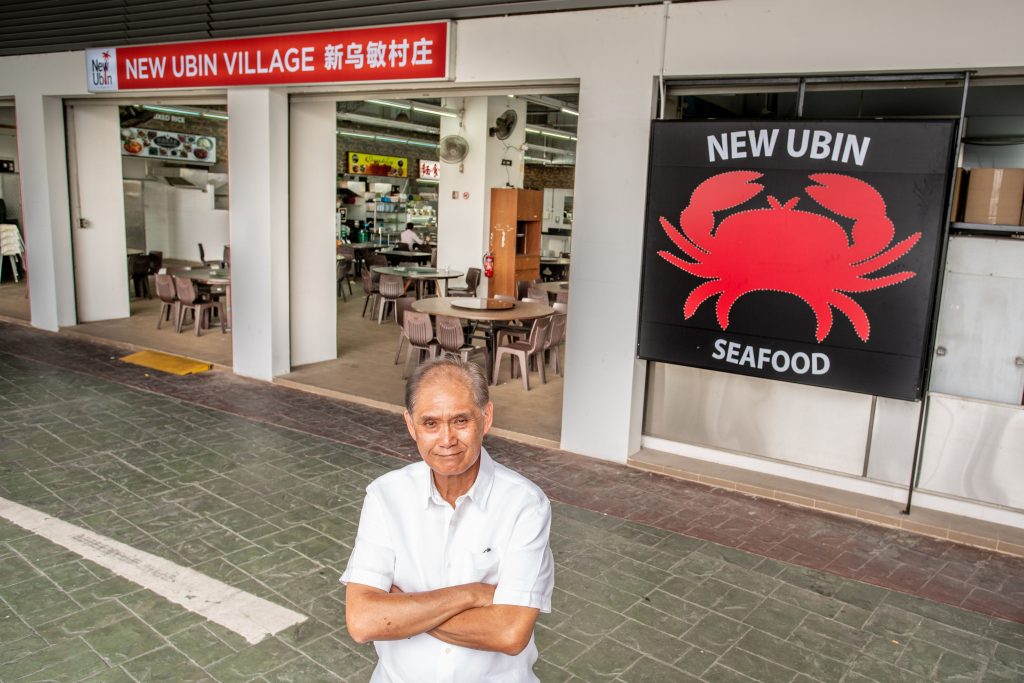
Towards the end of March, F&B operators started arranging to meet with government officials on April 1 to highlight this.
Eventually, it was only through a government decree that all landlords were compelled to pass on these rebates to tenants. This would constitute about 1.2 months of rent (presumably for March). For tenants, this was not seen as a gesture of goodwill from landlords because the rebate came from the government. But the decree has at least made some landlords sit up and take action.
Beyond March, different landlords will be offering different things, most a full waiver for April, while others discounts till July. As I write this, things are still evolving.
Far East and SPH REIT (Paragon, Clementi Mall, Seletar Mall) will be charging select F&B operators up to 15% of their gross turnover, or GTO. This means tenants don’t pay base rent, which usually equates to roughly 15-20% of sales (on a good day).
Mapletree (Vivocity, Business City), SMRT, Capitaland (Bugis+, Bedok Mall, Tampines Mall), and Suntec are offering between 30 to 50% discounts on rentals over 1 to 3 months (from April or May). LendLease (Parkway Parade, Jem) and Ascendas (Changi City) are offering 10-20% discounts over 1-2 months (from March). Starhill (Wisma Astria) is first to offer a one-time 40% rebate to tenants who choose to stay on. Different landlords, different strokes.
For a few others, tenants are getting either delayed responses or radio silence. So far, tenants have yet to receive information from property owners behind NEX, Ngee Ann City, SingPost, Sun Plaza and many more. This might change over time for sure.
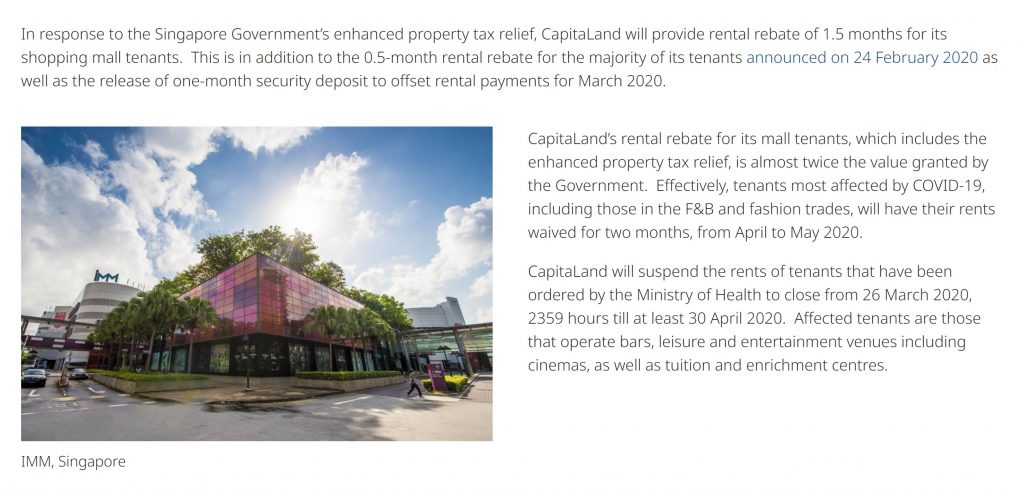
The prolonged delay in response is where F&B operators feel most frustrated, especially if they operate many outlets under different landlords. Not only are they seeing zero footfall and dine-ins (ie. circuit breaker), they are being jerked around and treated like cash registers, with the expectation they would pay up.
All tenants really want is for landlords to perceive them as life-or-death partners—waiving rentals in full if need be, or at best, charging rent based on GTO—to ride through this pandemic.
Without this mindset change, operators are left in the lurch.
After weathering between 30 to 70% dips in sales across their different sectors, Spa Esprit’s Chua is glad the government is helping operators, especially with the expedited rebates and enhanced job support schemes (50-75% subsidies). But she’s not sensing the same urgency with different landlords.
Together with Koon Beng (“KB”), CEO of WonderScape and director of Spa Esprit Group, Chua is protective of her brands, which include Tiong Bahru Bakery, boCHINche, NOKA, Ding Dong, The Tippling Club, The Butcher’s Wife, Forty Hands, Common Man Coffee Roasters and Open Farm Community. Besides Spa Esprit and Qi Mantra, Browhaus and STRIP fall under WonderScape.
So why are some landlords taking their sweet time to get their asses on the bandwagon? And why are some choosing to arrive later than others, if at all? Think what? Mafia entrance is it?
Despite three government relief budgets and circuit breaker measurements in place, some have still adopted a wait-and-see approach. Maybe some wish for Bloomberg’s yield forecast of 6.2% to miraculously materialise or harbour hopes of potential rebounds (wait long long).
Are they just sitting on a dragon-hoard of last year’s earnings, unable to see beyond their golden slippers?
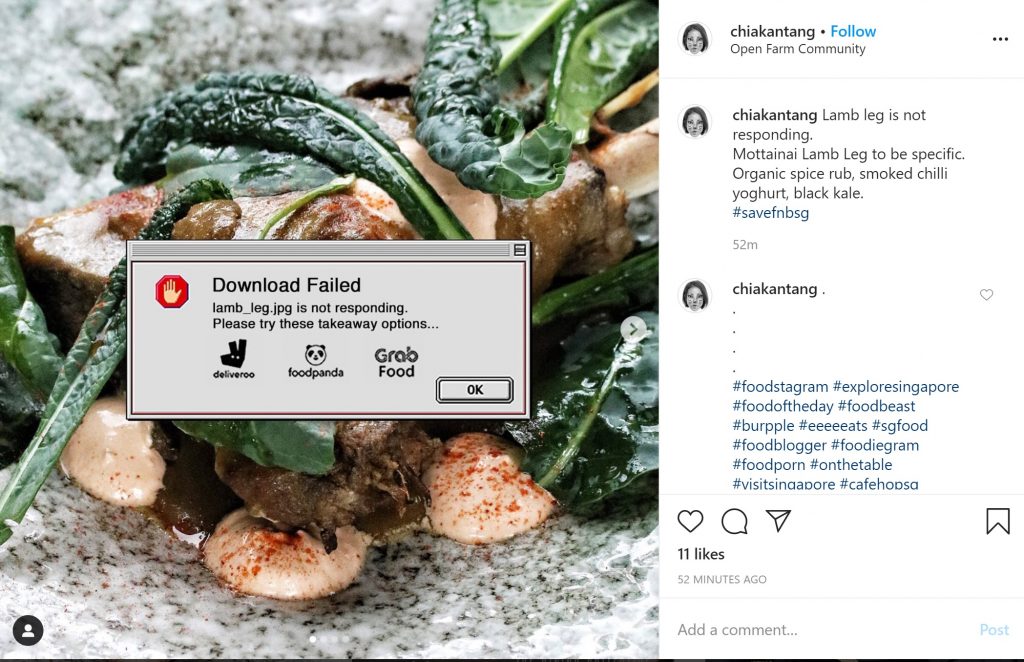
It is the nonchalance, or high-handedness towards their plight, that has gotten many tenants upset.
KB explains: “One landlord at first tried to do PR, claiming their board of directors is taking a 5-10% pay cut. Seriously, that has no impact whatsoever on helping us save on rent. Next, they planned to put a S$4.5m fund for tenants. They made almost S$200m in profits last year, so the fund is only 2% of that. Even if they give all of their tenants a 50% rebate, they would have made at least S$100m in profits. Just recently, another landlord I spoke to wanted a 6-7% increase in rent. After 3 rounds of negotiations, they said 3%. It’s ridiculous!”
“Landlords collect money passively; psychologically they’re distancing themselves from their tenants. To them, it’s “not their business.” It’s short-term thinking. They’re trying to protect their profits and projections. They should face the reality that last year’s projections are no longer relevant,” shares Howard Lo, owner of Empire Eats group of restaurants/bars like Tanuki Raw, Salmon Samurai, The World is Flat, Standing Sushi Bar and The Secret Mermaid.

For Lo and his wife, Hui Nan, their F&B operations have been severely impacted by Covid-19. They have two outlets at Changi Airport, which rely on traveller and tourist footfall. Many of their outlets in the CBD were affected a week after Dorscon Orange.
“Tenants pay high rents to shopping malls as it’s expected that the mall will draw crowds. The mall now has no crowd, yet we’re still paying rent as if everything’s normal. Aside from base rent, there’s a monthly “service charge” (maintenance fee), advertising & promotions, and various utility fees (electrical license renewal, gas renewal, etc.),” he tells me.
Beyond rent and monthly costs, mall tenants also have to deal with inflated prices when they first set up shop. Beyond the security deposits (usually 1-3 months’ worth), tenants are often forced to use only designated contractors, such as the landlord’s appointed lawyer, PE endorser, and so on. The cost to set up shop in a mall is usually 30-40% more than at a non-mall location, which is unfair to tenants from the get-go. It’s usually non-negotiable and locks tenants up.
For now, while the Ministry of Law is providing temporary relief for tenants who are unable to pay rent for the next six months (ie. eviction moratorium), many are concerned if they are liable to pay late-payment interest on top of deferred rent and accrued interest by the 7th month. It would be a death knell for all F&B operators, and the staff they employ.
“My hope is just survival. I feel for my staff. I employ 60 in F&B, 10 in my agency, and 20-30 people in construction. My businesses are small. But my hope is really just for survival. I’m not asking to make profits this year. That is impossible. I’m not asking to benefit in any way except for survival of the brand,” Rookery’s Ong says. He recommends setting up a government task force with the F&B industry so that everyone can come together quickly.
Chua adds, “I propose a lease forfeiture clause in tenancy agreements. Not only does it protect the tenants with an eviction moratorium, the landlord must meet the tenant, come together and agree on the rent price if they are unable to pay. Psychologically, the tone has to be different.”
KB suggests a legislation where the government imposes taxation on landlords if they do not provide one-for-one matching on government rebates.
Right now, what’s critical over the next six months will be cashflow and it’s important that landlords recognise that.
For his part, KB wants to free up security deposits to be bankers’ guarantees, talk to banks for bridging loans and drawdown when needed. He’s also looking at no-pay leave and MVC for staff contracts for business continuity. For all operators, the reality has already set in, and they’re neck-deep in it.
“We will be closing 1 or 2 small F&B brands. We need to keep our staff cost low. This is going to be a long-haul struggle, before the economy can get back on track. We are working on creative innovations, like pack-away sauces from our Open Farm Community, healthy food menus, effective delivery systems and adapting our business,” Chua explains.

“We are already in a cost-costing mode,” concurs New Ubin’s SM, “we’ve moved some of our operations off-shore. Our reservations, call centre, point-of-sale and accounting are now cloud-based. For us, our Tampines outlet in the heartlands has weathered this well. Kopitiams and canteens. People still need to eat.” New Ubin recently introduced UbinEats, a selection of dishes for solo eaters, with delivery provided by GrabFood or its own team.
Empire Eats’ Lo urges landlords to act now. He is hopeful landlords will support their tenants—they just have to navigate through layers of bureaucracy.
“There will be a minority of landlords who will not provide support. Worse, some might try to exploit their tenants. But with a community of commercial tenants coming together now, you can be sure it will be incredibly difficult for errant landlords to attract tenants in the future,” he says.
The detachment landlords seem to show towards the pain their tenants feel is made clear when some agree to only pass on property tax rebates (after a government decree), and nothing else. It shows their true colours. A few defray lost rentals by using tenants’ security deposits to fill up blanks in their monthly spreadsheets, masking them as deferred rent.
If you ask me, these guys are playing the short-term game. They’re moving numbers month-to-month to tide themselves through while keeping banks/shareholders/investors happy. It’s unfair to tenants. Especially when, according to Ong, 5 in 10 F&B operators or retailers are either closing or suspending. In a couple of months, we may see even more shutter, including our favourite food haunts.
Landlords need to be able to picture this before it’s too late. And they need to come together and act with unity, resilience and solidarity. Our government has done so swiftly—to the tune of S$60b in less than two months; the act itself is unprecedented. For some landlords, that’s probably the time it takes for a boardroom to debate over who they should invite to their charity golf event. As KB says, “Wake up!”
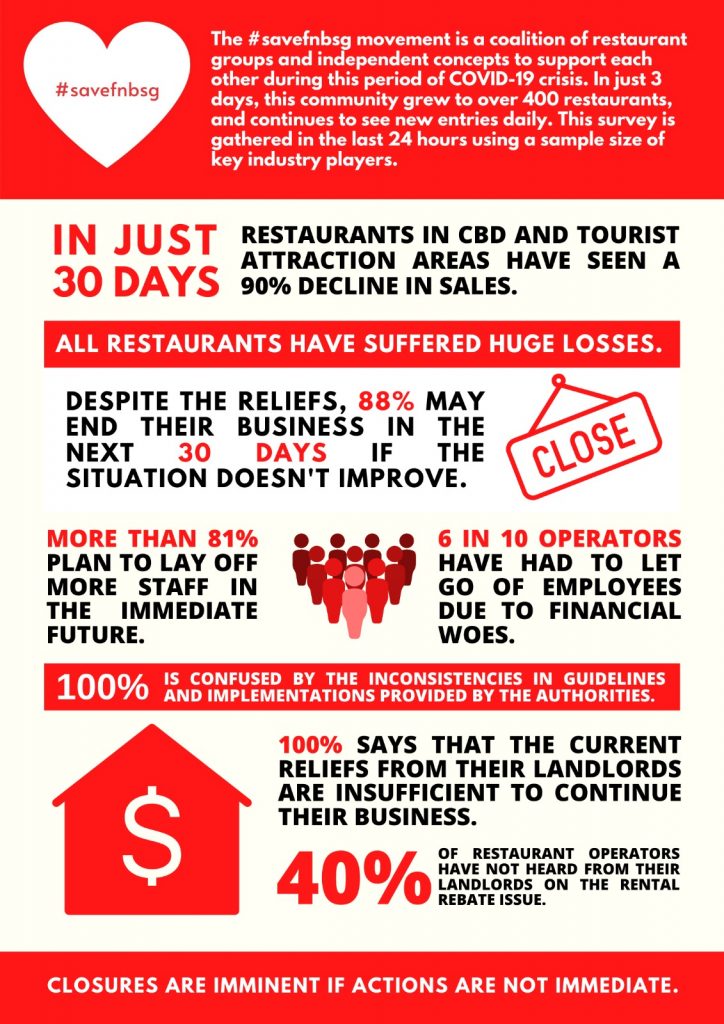
2020, however, will be a very different year.
SPH REIT warned investors that dividends will be shaved by 78.7% year-on-year. Other REITS are expected to follow suit. It means landlords recognise their earnings will be taking a hit; it’s just a question of how long and who else along the chain will be affected.
With deferred rental income from tenants and lower payouts to shareholders, share prices will take a hit (after months of positive growth). With lower market values and annual distributable income, banks will naturally be concerned, especially with mortgage loans and interests to pay, and “margin calls” to make.
No longer is it just about landlords and tenants now, but everyone up the chain, including shareholders and banks. After 18 years, the entire S-REIT and its financial credibility is at stake … or is it?
The result of recent developments is that every action is now closely monitored by “watchdogs” like the Restaurant Association of Singapore (RAS) and the Singapore Tenants United for Fairness (SGTUFF). This has put a spotlight on how landlords operate behind the scenes, and how it’s usually a one-sided affair, especially for tenancy agreements in shopping malls.
The REIT Association of Singapore (REITAS) highlighted some concerns in a press release.
Ironically, one part reads: By preventing landlords from repossessing premises when tenants default on rent payment, we deprive new tenants who may wish to lock in attractive market rents from taking up space. Landlords will no longer be able to rely on a commercial basis to renew their tenant registers to improve the overall quality and resilience of the property. It is therefore critical that the assessment of rental deferrals be undertaken with objectivity and commercial fairness to both landlord as well as tenant before such deferrals are granted.
What’s clear is that landlords need to act now if they want to save the industry, but who else in the chain will they try to save? For some, it’s the tenants. For others, I’m not so sure. A mindset change is necessary across-the-board, and it has to be now. Otherwise, if they’re going to take days to respond and act favourably, they might be next in line with an expiry date.
I just hope they’re awake now to realise they have one.
What else should landlords do to help save Singapore’s F&B industry? Is F&B the only industry that’s affected? Tell us at community@ricemedia.co.
